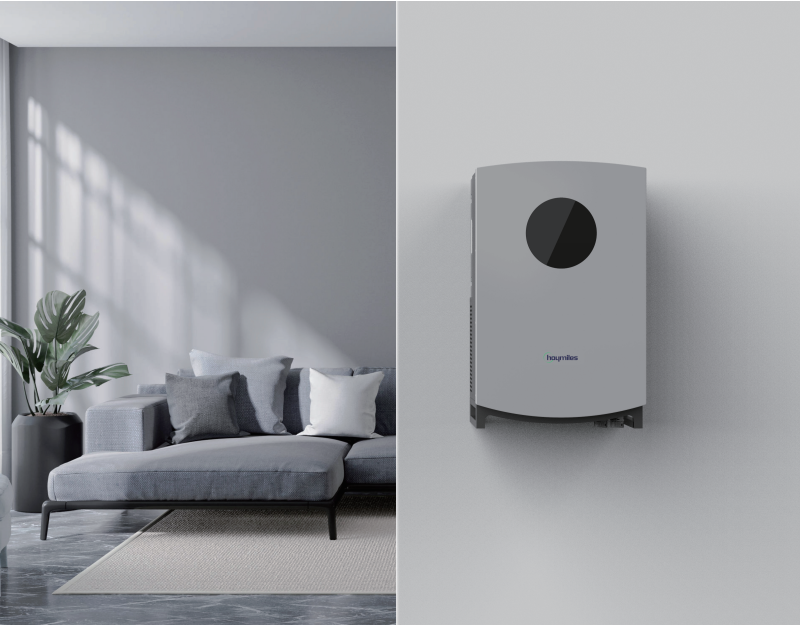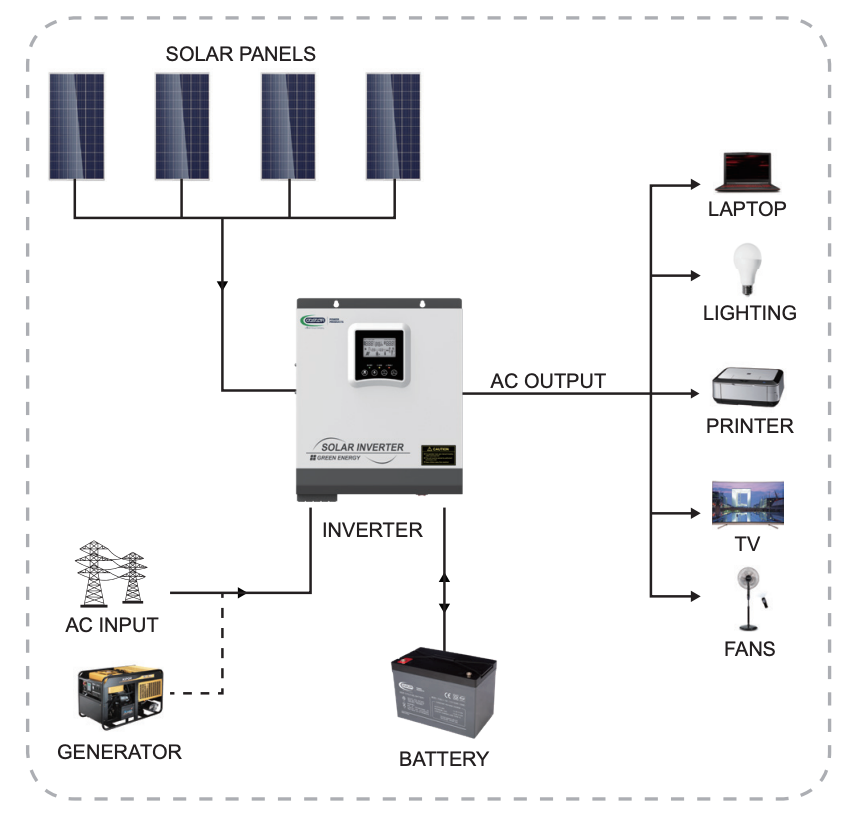
In einer Welt, in der erneuerbare Energien immer beliebter werden, Hausbesitzer und Unternehmen suchen nach Möglichkeiten, den Energieverbrauch zu senken und umweltfreundlicher zu sein. Mit Sonnenkollektoren, die auf Dächern auf der ganzen Welt installiert sind, Hybrid-Wechselrichter sind ein wichtiger Schritt hin zu einem einfacheren und nahtloseren Aufbau grüner Energie.
Ein Hybridwechselrichter ist ein elektronisches Gerät, das die Funktionen eines Mikrowechselrichters und eines Batterieladegeräts in einer einzigen Einheit vereint. Mit dieser Anleitung, Wir erklären Ihnen, was ein Hybrid-Wechselrichter ist, und geben Ihnen alle Informationen, die Sie darüber wissen müssen, Also fangen wir an!
Was ist ein Hybrid-Wechselrichter??
Hybridwechselrichter sind eine Art integrierter Wechselrichter, der Solar- und Batteriewechselrichter integriert. Sie können sich vorstellen, dass es sich um eine Kombination der Vorteile von Solar- und Batteriekonvertern handelt. Auf diese Weise, Solarenergie kann in Batterien gespeichert und dann bei Bedarf genutzt werden.
Seine Funktion ähnelt der eines gewöhnlichen netzgekoppelten Solarwechselrichters, Je nach Anwendung kann es jedoch in der Regel in einem von mehreren verschiedenen Modi betrieben werden. Dazu gehört ein Batterie-Backup-Modus, der im Falle eines Stromausfalls eine begrenzte Notstromversorgung bereitstellt. Die meisten Hybridwechselrichter können ohne Batterien betrieben werden und funktionieren wie netzgekoppelte Solarwechselrichter, indem sie überschüssige Solarenergie in das Netz exportieren.
Durch die Zusammenführung aller Schlüsselfunktionen von Solar- und Batteriespeichern in einem einfachen Plug-and-Play-Wechselrichter sind Hybridwechselrichter in der Regel wesentlich kostengünstiger und einfacher zu installieren als komplexere netzunabhängige Wechselrichtersysteme. Jedoch, Sie haben einige Einschränkungen und werden im Allgemeinen nicht für permanente netzunabhängige Installationen empfohlen.
Wie funktioniert ein Hybrid-Wechselrichter?
Die Hybrid-Wechselrichter sind wie ein intelligentes Stromverarbeitungszentrum, das je nach Stromverbrauch und Notstrombedarf Ihres Hauses in verschiedenen Modi arbeiten kann. Es weist viele Ähnlichkeiten mit herkömmlichen Solarwechselrichtern auf (auch als Reihenwechselrichter bekannt), Zum Beispiel die Umwandlung von Gleichstrom, der von Sonnenkollektoren erzeugt wird, in Wechselstrom, der in unserem täglichen Leben verwendet wird. Überschüssige Solarenergie kann zum Laden der an den Hybrid-Wechselrichter angeschlossenen Batterien genutzt werden.

Um den Stromfluss zu steuern, Es basiert auf einem Gerät, das als externer Energiezähler bezeichnet wird (oder CT-Meter) um den Stromverbrauch Ihres Hauses zu messen und festzustellen, wann zusätzlicher Strom zum Aufladen der Batterie verfügbar ist. Dieses Messgerät kann auch Lastdaten liefern, sodass der Wechselrichter weiß, wann er entladen muss, um die Geräte in Ihrem Zuhause mit Strom zu versorgen.
Die meisten Hybridwechselrichter können auf die folgenden vier Modi eingestellt werden:
Netzgekoppelter Modus: Er funktioniert wie ein normaler Solarwechselrichter ohne Batterien.
Hybridmodus: Überschüssige Sonnenenergie wird tagsüber gespeichert und nachts zur Verbesserung der Autarkie genutzt.
Backup-Modus: Wenn das Netz Strom hat, Es funktioniert wie ein gewöhnlicher Solarwechselrichter, Es kann jedoch automatisch in den Notstrommodus wechseln, wenn das Netz unterbrochen wird.
Off-Grid-Modus: Das Funktionsprinzip dieses Modus ist dem eines Inselnetz-Wechselrichters sehr ähnlich, Dabei wird überschüssige Solarenergie genutzt, um die Batterie aufzuladen und die Geräte im Haus ohne externen Netzanschluss mit Strom zu versorgen.
Jedoch, Nicht alle Hybrid-Wechselrichter sind für den Betrieb in netzunabhängigen Solarsystemen ausgelegt. Nur wenige werden die Notstromversorgung einschalten und betreiben, wie Generatoren, wenn nötig. Beispiele für solche Hybridwechselrichter sind die Tageswechselrichter.
Hybrid-Wechselrichter sind für normale Haushalte erschwinglich, die mit Solarenergie und Batterien autarker werden möchten, Sie möchten aber nicht vom Stromnetz getrennt sein oder häufige Stromausfälle erleiden.
Was ist der Unterschied zwischen einem Wechselrichter und einem Hybrid-Wechselrichter??
Wechselrichter wandeln Gleichstrom in Wechselstrom um, Das ist die Art von Elektrizität, die die meisten Haushaltsgeräte antreibt. Bei Verwendung in Kombination mit Solarmodulen, Sie ermöglichen es Ihnen, die von Sonnenkollektoren gesammelte Energie in nutzbaren Strom für Haushaltsgeräte umzuwandeln.
Jedoch, Es ist wichtig zu beachten, dass es sich um sehr kleine Solarkonfigurationen handelt (wie zum Beispiel die von Taschenrechnern oder Uhren) benötigen keine Wechselrichter, da ihr Strombedarf gering genug ist, um direkt mit Solarenergie betrieben zu werden. Jedoch, Jedes größere Gerät benötigt einen Wechselrichter, um ordnungsgemäß zu funktionieren, Aus diesem Grund sind die allermeisten Solaranlagen mit einem Wechselrichter ausgestattet.
Hybrid-Wechselrichter führen das Konzept der Wechselrichter noch einen Schritt weiter. Es kann nicht nur Gleichstrom in Wechselstrom umwandeln, sondern wandeln Energie auch austauschbar in Wechselstrom oder Gleichstrom um. Dies eröffnet neue Möglichkeiten für die Speicherung von Solarenergie; Mit Hybrid-Wechselrichtern können Sie Solarenergie zur späteren Nutzung in einem Batteriepaket speichern, ohne die gesamte erzeugte Energie verbrauchen zu müssen.
Eine der vorteilhaftesten Eigenschaften eines Hybrid-Wechselrichters besteht darin, dass Sie damit Strom an das Netz zurückgeben können. Wenn Sie nicht die gesamte von Ihren Solarmodulen erzeugte Energie verbrauchen und die überschüssige Energie nicht speichern müssen (Zum Beispiel, weil Ihr Akku bereits voll ist), Es kann den überschüssigen Strom an Ihr Energieversorgungsunternehmen zurücksenden und erhält dafür eine Gutschrift auf Ihrer nächsten Stromrechnung. Dies ist eine großartige Möglichkeit, die Kosten für die Installation einer Solaranlage auszugleichen, Dies kann ein sehr lukratives Unterfangen sein, wenn Ihr Energieversorger eine hohe Rückkaufquote bietet.
Es gibt drei Haupttypen von Hybrid-Wechselrichtern
Hybrid-Wechselrichter sind ein äußerst vielseitiges Werkzeug, mit drei Haupttypen, die unterschiedlichen Energieanforderungen gerecht werden.
1. Basis-Hybrid-Wechselrichter zur Speicherung von Solarenergie
2. Hybrid-Wechselrichter zur Speicherung und Notstromversorgung von Solarenergie
3. Batterie-Energiespeichersystem (BESS)
Es ist zu beachten, dass einige Hybridwechselrichter nicht über eine standardmäßige Notstromfunktion verfügen, und Sie müssen möglicherweise zusätzliche Notstromgeräte kaufen, wenn Sie im Falle eines Stromausfalls die Stromversorgung aufrechterhalten möchten. Auch so, Sie bleiben ein wichtiger Bestandteil des Stromversorgungssystems, insbesondere für die Nutzung von Solarenergie.
Was ist der Unterschied zwischen Hybrid-Wechselrichtern und anderen Wechselrichtertypen?

Im Vergleich zu herkömmlichen netzgekoppelten und netzunabhängigen Wechselrichtern, Hybrid-Wechselrichter haben mehrere Vorteile. Sie bieten eine größere Flexibilität und können für ein breiteres Anwendungsspektrum eingesetzt werden. Zum Beispiel:
Größere Energieunabhängigkeit: Es ermöglicht Ihnen, überschüssige, von Solarmodulen erzeugte Energie zu speichern und bei Bedarf zu nutzen, Reduzieren Sie Ihre Abhängigkeit vom Stromnetz.
Niedrigere Stromrechnungen: Durch die Nutzung gespeicherter Energie in Zeiten hoher Strompreise, Sie können Geld bei Ihren Energierechnungen sparen.
Erhöhte Energiesicherheit: Im Falle eines Stromausfalls, Strom kann weiterhin bereitgestellt werden, dank der Kompatibilität ihres Energiespeichers mit ihren Batteriepaketen.
Vor- und Nachteile von Hybrid-Wechselrichtern
Moderne netzgekoppelte Hybrid-Wechselrichter bieten einige Vorteile, Es gibt aber auch einige Nachteile, die Sie beachten sollten. Hier sind einige seiner Vor- und Nachteile, die Sie berücksichtigen sollten.
Vorteile
Hybrid Solarwechselrichter sind effizienter als herkömmliche Wechselrichter, und sie sind auch vielseitiger. Sie können mit einer Vielzahl verschiedener Batteriespeichersysteme verwendet werden, Damit sind sie eine gute Wahl für alle, die Solarenergie optimal nutzen möchten. Schauen wir uns ihre Hauptvorteile wie folgt an:
Kraftelastizität
Eine Solarstromanlage garantiert nicht immer, dass Sie auch bei einem Stromausfall weiterhin Strom haben. Wenn Ihr System einen herkömmlichen, an das Solarnetz angeschlossenen Wechselrichter verwendet, Aus Sicherheitsgründen wird die Stromversorgung des Solarpanelsystems bei einem Stromausfall weiterhin automatisch abgeschaltet.
Hybridwechselrichter gepaart mit Solarzellenspeichersystemen sind für diese Situation eine hervorragende Lösung. Es stellt sicher, dass Sie sowohl netzunabhängige als auch netzgebundene Fähigkeiten haben, So haben Sie immer Zugriff auf Strom, auch bei Ausfällen.
Batteriespeicher einfach nachrüsten
Die Installation einer kompletten Solaranlage kann ein Vermögen kosten, vor allem, wenn Sie ein separates System zur Speicherung von Strom hinzufügen müssen. Hybrid-Wechselrichter leisten dies sehr gut, Integration der Fähigkeit, Strom bei Bedarf zu speichern, Sie müssen sich also keine Gedanken über die Installation eines Batteriespeichers machen. Nach der Installation eines Hybridwechselrichters, wenn Sie den Akku vergrößern möchten, es wird sehr einfach werden, und Sie können weiterhin die Vorteile der Solarenergie genießen.
Einfache Energieüberwachung
Hybrid-Wechselrichter erleichtern zudem die Energieüberwachung erheblich. Denn Sie können wichtige Daten wie Leistung und Energieproduktion über das Wechselrichterpanel oder angeschlossene Smart-Geräte überprüfen. Wenn Ihr System aus zwei Wechselrichtern besteht, dann müssen Sie sie separat überwachen. Aber wenn Sie einen Hybrid-Wechselrichter verwenden, Du hast dieses Problem nicht.
Nachteile
Nicht für die Aufrüstung bestehender Systeme geeignet
Wenn Sie Ihre bestehende Solarstromanlage um einen Batteriespeicher erweitern möchten, Die Wahl eines Hybrid-Wechselrichters kann die Situation verkomplizieren, Während ein Batteriewechselrichter möglicherweise kostengünstiger ist. Was Sie wirklich brauchen, ist eine AC-gekoppelte Batterie mit eigenem Batteriewechselrichter zur Erweiterung Ihres Systems. Da Sie bereits über einen netzgekoppelten Solarwechselrichter verfügen, wenn Sie ihn durch einen Hybrid-Wechselrichter ersetzen möchten, Möglicherweise müssen Sie Ihr Solarpanelsystem neu konfigurieren, was sowohl aufwendig als auch teuer sein kann.
Erhöhung der Ausrüstungskosten
Die anfänglichen Installationskosten von Hybridwechselrichtern können höher sein als die von herkömmlichen Solarwechselrichtern. Wenn es in Ihrer Region häufig zu Stromausfällen kommt und Sie in Zukunft Backup-Batterien hinzufügen möchten, Ein Hybrid-Wechselrichter kann sich aufgrund der höheren Kosten lohnen. Jedoch, wenn Ihr Netz stabil ist und Sie bereits über Net Metering verfügen, dann kann ein normales netzgekoppeltes System ausreichend sein, und es kann wirtschaftlicher sein als ein Hybrid-Wechselrichter plus Batteriespeicher.
Weniger Flexibilität bei der zukünftigen Gestaltung
Mit fortschreitender Technologie, Das Design von Solarzellen verändert sich ständig, Und nicht alle Hybridwechselrichter sind für jeden Zelltyp geeignet. Wenn Sie jetzt einen Hybrid-Wechselrichter installieren und beabsichtigen, in naher Zukunft Solarzellen hinzuzufügen, Ihre zukünftigen Optionen können durch Kompatibilitätsprobleme eingeschränkt sein. Zum Beispiel, Einige Solarpanel-Energiespeichersysteme sind mittlerweile mit eingebauten Wechselrichtern ausgestattet, Dadurch entfällt überhaupt die Notwendigkeit eines separaten Hybrid-Wechselrichters.
Wie viel kostet ein Hybrid-Wechselrichter??

Die Kosten eines Hybrid-Wechselrichters sind schwer zu beziffern, da die Preise je nach Marke und Modell des Wechselrichters sowie seiner Kapazität variieren. Allgemein, Es ist teurer als herkömmliche Wechselrichter mit Einzelfunktion, Aber da sich die Solar- und Batterietechnologie weiterentwickelt, Dies ist möglicherweise nicht immer der Fall.
Zum Beispiel, wenn Ihre PV-Anlage am Ende ca. kostet $22,500 (die durchschnittlichen Kosten einer 7,5-kW-Wohnanlage), Sie können damit rechnen, etwa auszugeben $1,350 Zu $2,250 auf einem Hybrid-Wechselrichter.
Der Grund, warum Hybrid-Wechselrichter teurer sind als herkömmliche Wechselrichter, liegt darin, dass sie die drei wichtigsten Funktionen erneuerbarer Energiesysteme in einem vereinen, und sie sind kleiner. Jedoch, im Vergleich zum Kauf und Einbau eines separaten Batteriesystems, Es ist wahrscheinlicher, dass es sich auf lange Sicht amortisiert, da es eine höhere Effizienz und geringere Installationskosten aufweist.
Zusätzlich, Es hilft Haushalten und Unternehmen, ihre Energiekosten durch Selbstversorgung zu senken. Eine intelligente Überwachung des Netzstroms und die Möglichkeit, überschüssige Energie zu verkaufen, wenn sie nicht benötigt wird, sind ebenfalls eine Möglichkeit, die Energiekosten zu senken.
Sollten Sie in einen Hybrid-Solarwechselrichter investieren??
Während Hybrid-Solarwechselrichter eine hohe Anfangsinvestition erfordern, Die zusätzlichen Kosten können sich lohnen, wenn Sie die Installation eines Solarzellenspeichers während oder kurz nach Ihrer ersten Solarinstallation planen.
Hybrid-Wechselrichter tragen dazu bei, Probleme wie intermittierendes Sonnenlicht und unzuverlässige Versorgungsnetze zu beseitigen, Daher ist ihre Leistung im Vergleich zu anderen Arten von Solarwechselrichtern hervorragend. Noch besser, Es hilft Ihnen, Energie effizienter für die zukünftige Nutzung zu speichern, einschließlich Notstrom für den Einsatz bei Ausfällen oder Spitzenzeiten.
Hybrid-Wechselrichter können zudem eine effizientere Erzeugung und Verwaltung ermöglichen, insbesondere wenn es um Beziehungen zum größeren Netz durch Net Metering und Nutzungszeittarife geht. Zusätzlich, Dank hochmoderner Technologie können Sie Ihre Solaranlage ganz einfach von überall aus über eine verbundene Smartphone-App überwachen und verwalten.
Abschluss
Da die Wechselrichtertechnologie effizienter wird, Hybrid-Solarwechselrichtersysteme bieten eine kostengünstige Möglichkeit, die Notstromversorgung dann aufrechtzuerhalten, wenn Sie sie am meisten benötigen, ohne Kompromisse bei der Effizienz einzugehen.
GYCX Solar kann Ihnen bei der Auswahl der besten Solarenergielösung für Ihr Zuhause oder Ihr Unternehmen helfen. Wir machen die Nutzung von Solarenergie so einfach wie möglich. Kontaktiere uns Heute Und wir kümmern uns um alles, vom Entwurf Ihrer einzigartigen Solaranlage bis zur Installation, Wartung und Überwachung.
